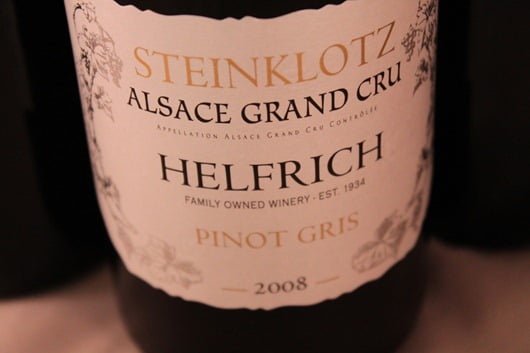Helfrich Steinklotz Alsace Grand Cru Pinot Gris 2008
December 24, 2010Grape
100% Pinot Gris [Pee-no Gree]
The word "Pinot", comes from the French word for pinecone" The grape grows in small pinecone shaped bunches on the vine. Grigio (Italian) or Gris (Everywhere Else) eludes to the unusual grey-blue color of the grapes.
Facts
Even though Pinot Grigio and Pinot Gris are the same grape, the differences in the wines produced from these grapes can be huge.
Pinot Grigio is the Italian version of the grape, known for its light, crisp acidity.
Pinot Gris from from the Alsace region of France creates richer, more stone-fruit-driven wines.
There are many synonyms for Pinot Gris. In Alsace, it is known at Tokay Pinot Gris and in Germany it is known as Ruländer or Grauburgunder. It can also go by Pinot Beurot, Malvoisie, Tokay d’Alsace, Topaque, Szurkebarat, Rülander, Auvernat Gris, Auxerrois Gris, Fauvet, Fromentot and Grauer Mönch. As if wine isn’t confusing enough!!!!
Pinot Gris is thought to be a clone of the Pinot Noir grape, which would account for the color of the grayish-blue fruit. Supposedly the leaves and the shape of the vines of both grapes are so alike, that vineyard workers can only tell the grapes apart by the actual color of the grapes.
The Helfrich family has been crafting wines in Alsace for six generations. They have been leading the Alsatian Renaissance with grapes from centuries old vineyards and employing modern wine making methods with a minimalist touch in order to let the land show the true character of the grapes.
The Helfrich Steinklotz Alsace Grand Cru Pinot Gris received 90 points (out of 100) in the Wine Spectator.
Place
At the top North-Eastern corner of France is the Alsace wine region. Within that region is the Steinklotz Grand Cru, one of only 51 vineyards in Alsace that has the Grand Cru designation.
Roughly translated, Steinklotz means “stony block”, obviously alluding to the stony / minerally soil in the region.
With the numerous wars that have taken place tin Europe throughout history, Alsace has changed hands multiple times between France and Germany.
All the grapes that go into the Helfrich Grand Cru Pinot Gris are harvested by hand.
One of the biggest problems when growing grapes in Alsace and Germany is that there isn’t a huge amount of sunlight. Alsatian winemakers obviously know this, and through carefully selecting the hillside slopes for vineyards and also training the vines on upward facing trellising, they do everything they can to give their grapes the most sun exposure as possible.
Steinklotz is one of the oldest vineyards recorded in Alsace and was reported in 589 AD to belong to King Childebert II.
Taste
It’s been a little while (about 3 months) since I’ve tasted a wine from Alsace. It’s not because I not a fan of the region, it’s quite the opposite in fact. I love Alsatian wines! The problem is that their availability is limited both in retail locations and on restaurant wine lists.
Because wines from Alsace have at minimum a hint of sugar, they are perfect for new wine drinkers. I know that people would love Alsatian wines if they would only be a little more adventurous with their palates!
The Helfrich Steinklotz Alsace Grand Cru Pinot Gris is full in flavor showing honey-soaked apricot, peach and baked-pear. Aromatic and minerally, certainly has some residual sugar, but stays in balance with the acidity. Finishes long and smooth. Perfect drinkable by itself, but would be even better with food…
Pairing
Alsatian wines are made for food, and I recommend the Helfrich Steinklotz Alsace Grand Cru Pinot Gris would pair excellently with mushroom risotto, pork, honey-baked ham, shellfish and smoked salmon, as well as traditional European dishes such as duck confit, foie gras and liver paté.
Price
$25 and available from UnderdogWineMerchants.com as well as select retailers .
In my very humble opinion I was very impressed with the Steinklotz Alsace Grand Cru Pinot Gris and would certainly like to see what some of their other wines have to offer!
This entry was posted in Reviews and tagged Underdog Wine Merchants. Bookmark the permalink. ← Want to See What This Year’s Christmas Card Looks Like? Getting to Know Alsace Grand Cru’s →











